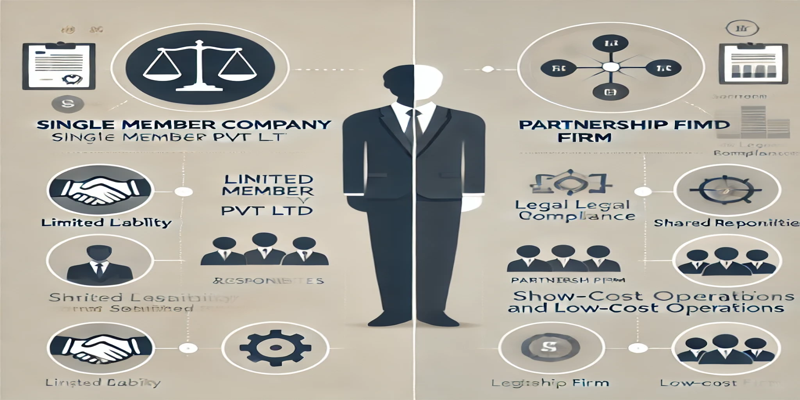The choice of business structure is one of the most critical decisions an entrepreneur must make. Among the many options available, the Single Member Company (SMC Pvt Ltd) and the Partnership Firm are two common structures that cater to different needs and circumstances. This article provides an in-depth comparison of SMC Pvt Ltd and Partnership Firm, exploring their definitions, features, advantages, disadvantages, legal frameworks, and suitability for different business scenarios.
Understanding SMC Pvt Ltd
Definition
A Single Member Company (SMC) Pvt Ltd is a private limited company owned and managed by a single individual. It is a distinct legal entity, meaning it operates separately from its owner and is governed under specific corporate laws.
Key Features
- Separate Legal Entity: SMC Pvt Ltd has its legal identity, distinct from its owner.
- Limited Liability: The owner’s liability is limited to the capital invested.
- Perpetual Succession: The company’s existence is not affected by the death or incapacity of its owner.
- Single Ownership: As the name suggests, the company is owned and controlled by a single person.
- Regulation: In Pakistan, for instance, SMCs are governed by the Companies Act, 2017, under the jurisdiction of the Securities and Exchange Commission of Pakistan (SECP).
Advantages
- Limited Liability: Protects the owner’s personal assets from business liabilities.
- Credibility: Enhances trust among stakeholders due to its structured and regulated nature.
- Tax Benefits: Often enjoys lower tax rates compared to unregistered businesses.
- Separate Ownership and Management: Allows the owner to appoint professionals for business operations.
- Ease of Transfer: Ownership can be transferred through the sale of shares.
Disadvantages
- Compliance Requirements: Needs to adhere to strict legal and reporting obligations.
- Setup Costs: Higher registration and operational costs compared to informal structures.
- Decision-Making: The owner bears sole responsibility for decision-making, which can be stressful.
Understanding Partnership Firm
Definition
A partnership firm is a business entity formed by two or more individuals who agree to share profits and losses. Partnerships are usually governed by a partnership deed and, in many jurisdictions, operate under the Partnership Act.
Key Features
- Joint Ownership: Owned and managed by multiple partners.
- Shared Liability: Partners are jointly and severally liable for the firm’s obligations.
- Profit Sharing: Profits and losses are distributed among partners as per the agreement.
- Mutual Agency: Each partner can act on behalf of the firm.
- Lack of Perpetual Succession: The firm dissolves upon the death, insolvency, or withdrawal of a partner unless otherwise stated in the agreement.
Advantages
- Ease of Formation: Requires minimal legal formalities to establish.
- Shared Responsibility: Workload and decision-making are shared among partners.
- Flexibility: Offers operational flexibility without rigid regulatory requirements.
- Cost-Effective: Lower setup and operational costs compared to SMC Pvt Ltd.
Disadvantages
- Unlimited Liability: Partners’ personal assets are at risk in case of business liabilities.
- Disputes: Differences in opinions may lead to conflicts among partners.
- Lack of Credibility: May face challenges in building trust with stakeholders due to its informal nature.
- Limited Growth Potential: Restricted by the financial and managerial capabilities of the partners.
Legal Framework
SMC Pvt Ltd
- Formation: Requires registration with the Registrar of Companies and compliance with corporate laws.
- Regulation: Governed by the Companies Act (varies by jurisdiction, e.g., Companies Act, 2017 in Pakistan).
- Taxation: Treated as a separate entity for tax purposes, with corporate tax rates applied.
- Reporting: Mandates regular financial reporting, audits, and annual general meetings.
Partnership Firm
- Formation: Can be formed through a simple partnership deed and, optionally, registered with relevant authorities.
- Regulation: Governed by the Partnership Act (varies by jurisdiction).
- Taxation: Partners are taxed individually on their share of profits, as the firm is not treated as a separate entity.
- Reporting: Minimal reporting requirements compared to companies.
Comparison Table: SMC Pvt Ltd vs Partnership Firm
| Aspect | SMC Pvt Ltd | Partnership Firm |
|---|---|---|
| Legal Status | Separate legal entity | Not a separate legal entity |
| Ownership | Single owner | Two or more partners |
| Liability | Limited to capital invested | Unlimited for partners |
| Regulation | Governed by corporate laws | Governed by the Partnership Act |
| Taxation | Corporate tax rates | Individual tax rates |
| Perpetual Succession | Yes | No |
| Compliance | High | Low |
| Credibility | High | Moderate |
| Profit Sharing | Not applicable | As per partnership agreement |
| Ease of Formation | Moderate | Easy |
| Setup Costs | High | Low |
| Decision-Making | Centralized | Shared |
When to Choose SMC Pvt Ltd
An SMC Pvt Ltd is suitable for entrepreneurs who:
- Seek Limited Liability: Prefer to protect personal assets from business risks.
- Plan for Growth: Intend to expand operations and attract investments.
- Require Credibility: Want to build trust with customers, suppliers, and investors.
- Can Manage Compliance: Are prepared to meet stringent legal and reporting requirements.
When to Choose a Partnership Firm
A partnership firm is ideal for:
- Small Businesses: Suitable for startups with minimal capital and operational needs.
- Shared Expertise: Beneficial when partners bring diverse skills and resources.
- Flexibility Needs: Offers operational flexibility without rigid formalities.
- Cost-Conscious Entrepreneurs: Prefers a cost-effective structure with fewer legal obligations.
Case Studies
Case Study 1: Expansion Potential
An entrepreneur in Pakistan initially operated as a sole proprietor but decided to transition to an SMC Pvt Ltd. The company’s limited liability and credibility helped secure a bank loan and attract foreign investors, enabling the business to expand its operations.
Case Study 2: Small Retail Business
A group of friends started a small retail business as a partnership firm. The shared liability and collective decision-making suited their low-risk and community-oriented business model. However, disputes among partners eventually led to dissolution.
Conclusion
Choosing between an SMC Pvt Ltd and a Partnership Firm depends on factors such as liability tolerance, growth aspirations, compliance capabilities, and cost considerations. While SMC Pvt Ltd offers enhanced credibility and limited liability, it comes with higher compliance requirements. In contrast, partnership firms are cost-effective and flexible but involve unlimited liability and potential conflicts. Entrepreneurs must carefully evaluate their business needs and long-term goals before selecting the appropriate structure.


